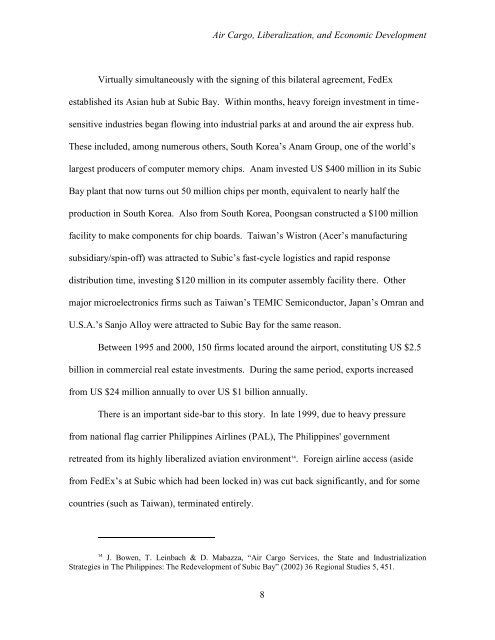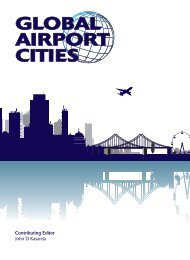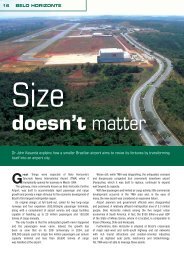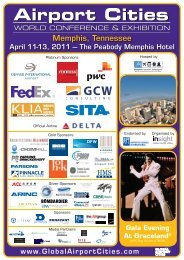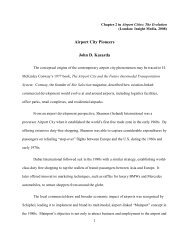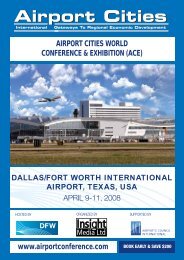Air Cargo: Engine For Economic Development - Aerotropolis
Air Cargo: Engine For Economic Development - Aerotropolis
Air Cargo: Engine For Economic Development - Aerotropolis
Create successful ePaper yourself
Turn your PDF publications into a flip-book with our unique Google optimized e-Paper software.
<strong>Air</strong> <strong>Cargo</strong>, Liberalization, and <strong>Economic</strong> <strong>Development</strong><br />
Virtually simultaneously with the signing of this bilateral agreement, FedEx<br />
established its Asian hub at Subic Bay. Within months, heavy foreign investment in timesensitive<br />
industries began flowing into industrial parks at and around the air express hub.<br />
These included, among numerous others, South Korea’s Anam Group, one of the world’s<br />
largest producers of computer memory chips. Anam invested US $400 million in its Subic<br />
Bay plant that now turns out 50 million chips per month, equivalent to nearly half the<br />
production in South Korea. Also from South Korea, Poongsan constructed a $100 million<br />
facility to make components for chip boards. Taiwan’s Wistron (Acer’s manufacturing<br />
subsidiary/spin-off) was attracted to Subic’s fast-cycle logistics and rapid response<br />
distribution time, investing $120 million in its computer assembly facility there. Other<br />
major microelectronics firms such as Taiwan’s TEMIC Semiconductor, Japan’s Omran and<br />
U.S.A.’s Sanjo Alloy were attracted to Subic Bay for the same reason.<br />
Between 1995 and 2000, 150 firms located around the airport, constituting US $2.5<br />
billion in commercial real estate investments. During the same period, exports increased<br />
from US $24 million annually to over US $1 billion annually.<br />
There is an important side-bar to this story. In late 1999, due to heavy pressure<br />
from national flag carrier Philippines <strong>Air</strong>lines (PAL), The Philippines' government<br />
retreated from its highly liberalized aviation environment 14 . <strong>For</strong>eign airline access (aside<br />
from FedEx’s at Subic which had been locked in) was cut back significantly, and for some<br />
countries (such as Taiwan), terminated entirely.<br />
14<br />
J. Bowen, T. Leinbach & D. Mabazza, “<strong>Air</strong> <strong>Cargo</strong> Services, the State and Industrialization<br />
Strategies in The Philippines: The Redevelopment of Subic Bay” (2002) 36 Regional Studies 5, 451.<br />
8


